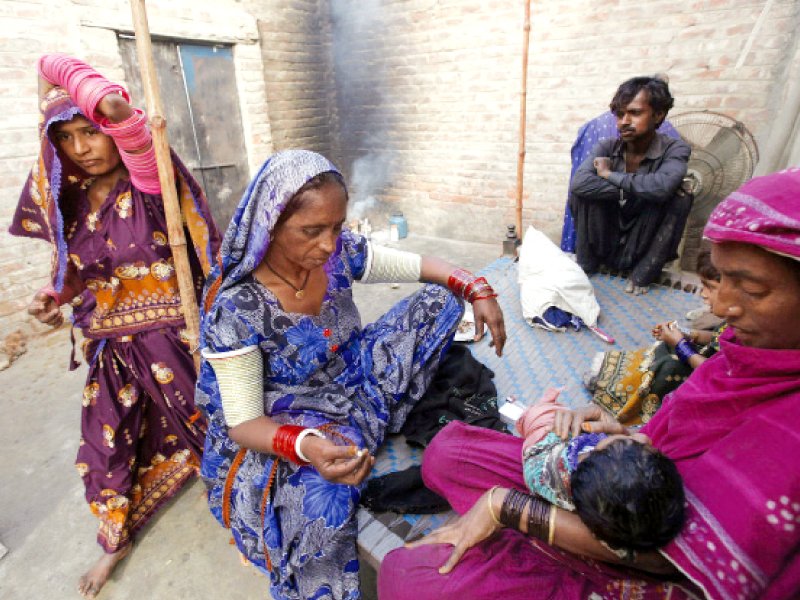
The informal and bonded labourers employed in various sectors of the economy continue to suffer in the absence of a law that guarantees their protection. Deprived of the labour status and consequently, the social security that accompanies it, these labourers remain exposed to exploitation.
After the 18th constitutional amendment, all provincial governments were required to legislate the anti-bonded labour laws keeping in view its federal version, the Bonded Labour System (Abolition) Act, 1992. The Sindh government, however, has failed to adopt the law as it came under fire from the other stakeholders over the provision of legalising the advance (peshgi) system, which lies at the root of the problem.
“The Sindh government wants to legalise the peshgi system which had been quashed in the law’s federal version in the 1992 Act,” Kashif Bajeer, the national manager of the Society for Protection of Rights of Children (Sparc), told a consultative workshop on Monday. The event was organised by Sparc and Action Aid as part of their ongoing campaign to formulate draft proposals to lobby the Sindh government.

According to the 1992 Act, the advance (peshgi) is any cash or kind given by an employer to an employee as payment for their labour. The system makes a labourer incur bonded debt against which they may have to offer their services for free for a specific period of time.
Bajeer explained that the civil society activists wanted the provincial government to enact the labour law without delay and without making the advance (peshgi) system legal. “Every other day, the media reports about a team of police raiding the farmlands of a landlord or a brick kiln owner to rescue the peasants or labourers kept in debt bondage. Though the issue is being highlighted in the media for the last two decades, the law and its enforcement are still missing,” observed Mustafa Baloch of Strengthening Participatory Organisation.
Sparc’s project coordinator for bonded labour, Zahid Thebo, pointed out that the government also wanted to add or exclude some other controversial provisions in the provincial law which the activists opposed. One such provision which the government wanted to erase pertained to the five-year jail term, under Criminal Procedure Code’s section 374, for exacting forced labour. The bonded labourer’s right to ownership of a bonded property is enshrined in the 1992 Act, explained Thebo. The Sindh government wanted, however, a review of this clause with the aim to get rid of it, he lamented.
“Until the political system remains under the control of the feudal lords, it will be very difficult to ensure provision of universal labour rights to our workers,” Zulfiqar Halepoto, a researcher and civil rights activist, contended. He said that the politicians were stakeholders in a system of exploitation which worked against the peasants’ and labourers’ rights and interests. He stressed, however, that the struggle to pressurise the lawmakers to legislate better laws must continue.
A lawyer, Zarina Karnani, also shared similar observations, describing the feudal elite and legislators as a stumbling block for peasants’ rights.
Action Aid’s project director Samina Gul explained that her organisation was lobbying with the governments of Sindh, Balochistan and Khyber Pakhtunkhwa to enact the [anti]bonded labour laws. “The Sindh government wants to make rules in view of their specific circumstances. They can take cue from the Punjab government which has already made the law.”
Published in The Express Tribune, January 21st, 2014.
COMMENTS (4)
Comments are moderated and generally will be posted if they are on-topic and not abusive.
For more information, please see our Comments FAQ

















@sabi: Shame, shame, shame on you.
Unless and until the bonded labor and kiln workers are not freed from this abominable system and our constitution is not amended or entirely changed, Pakistan will continue to suffer. The PPP has totally and completely lost the path of truth and honesty. Salams to the bonded and kiln labor.
Ngo's along with media giving absolutely false picture of the whole story concerning' bonded labour'.In reality its the worker, the biggest exploiter whereas employer a loser.
Shame on those landlords and feudal who still treat humans as their slaves. The Fed and Provincial govt both owe it to the poor people to free them from the clutches of tyrants. This is not a matter of party or politics and all should unite against this old tradition.
Shame on Sindh government and therefore on PPP. I am lost for words, it's 2014, millions of people continue to suffer, and these legislators seems to be deprived of any humanity.